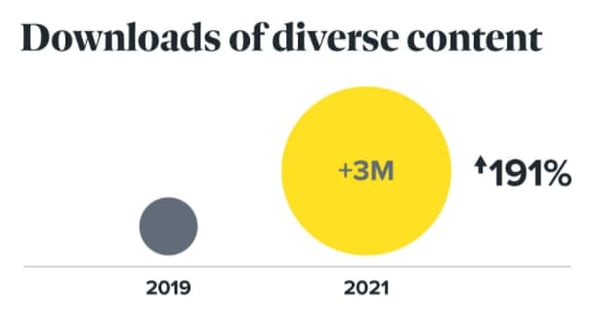Inclusive content is no longer considered a bonus for video marketers; Diversity, Equity & Inclusion (DEI) is an integral component of an effective video content strategy.
According to Facebook Advertising, 64% of audiences in the US, UK, and Brazil said they would like to see more diversity. Deloitte's Heat Test Report found 69% of brands with representation in ads saw an average stock gain of 44%.
But where does one start? Diversity isn't something you can simply check off a list — implementing inclusive content is complex. It has many facets internally and externally in an organization and includes multiple areas that must be taken into consideration when brand and marketing teams plan and produce diverse content strategies.
Many marketers are working against legacy systems and ways of doing things that have been in practice for years, if not decades or more. What can brands and marketing teams do today to start implementing successful DEI content strategies?
At Storyblocks, a rapid video creation company, we've released the Diversity in Video Report to help businesses and marketers implement effective DEI content strategies. Through conducting quantitative and qualitative market analysis over a period of the last four years, we could see how the DEI landscape has evolved in video marketing and determine what the key takeaways are for brands today.
About the Diversity in Video Report
Thanks to our growing diverse video content library at Storyblocks, we've been given unique access to what is important to content creators and brands today. Our research analyzes over 250 million searches and over 45 million downloads from our user database of businesses, marketing teams, and individual content creators from 18 industries worldwide.
In addition to these quantitative data points, the research also includes a qualitative in-depth analysis of noteworthy brand DEI initiatives over the last few years. Through evaluating what the top global brands have done to implement DEI strategies, this qualitative study shines a light on best practices and lessons to be learned from the successes and failures of the big players in the market. We include specific examples from companies like Citi, Netflix, Sesame Street, and more.
Diversity in Video Report Findings
1. Diversity doesn't stop at race.
Diversity is often thought of in terms of race, but our research suggests that diversity in video marketing extends beyond that. Diversity has many layers and includes diversity in faith, age, sexual orientation, ability, body type, and more in addition to racial diversity.
In 2021 the top five DEI keywords and searches by all businesses were: body diversity, elderly, Muslim, general diversity, and African American.
Body diversity, particularly the representation of plus-sized bodies, is something multiple industries prioritized in 2021. This is an area of diversity that has been historically underrepresented, with most ads showing thin body types. Today marketers are approaching this differently, highlighting the importance of body diversity in content planning.
2. There's an increased demand for BIPOC representation in media and marketing.
Compared to 2019, there has been a 113% increase in BIPOC (Black, Indigineous, and People of Color) video searches from members and visitors, with 937,000 more searches in 2021. There has been a 195% increase in the number of BIPOC video downloads, with 2.3 million more downloads in 2021 compared to 2019.

This increase in demand for BIPOC representation in media is likely linked to the murder of George Floyd and the vast racial inequities that led to increased coverage of the Black Lives Matter (BLM) movement that took place in the spring of 2020.
This movement resulted in a global cultural awakening that led to a ripple effect on different facets of media and business. Similar to the evolution of BLM, demand for BIPOC representation in media is not a 'moment' — the movement is still continuing and growing today.
3. Demand for diversity is clear with an increase of over 100% in just two years.
It's clear that brands and video marketers are getting the message and listening to consumers' undeniable demands for representation. Many businesses have been prioritizing inclusion when producing video content in the last few years.
In 2021, diversity searches including race, ethnicity, ability, age, body and LGBTQIA+ increased by 104% from 2019, with 1.1 million more diversity searches in 2021 from both Storyblocks members and visitors.
Similarly, downloads of diverse content increased by a massive 191% from 2019, with 3 million more downloads of content that include more authentic representation of communities in 2021.

What the future of diverse content looks like.
The data indicate DEI is not a trend — the increase in diverse video content creation and consumption in media is increasing. We see DEI in video and advertising becoming an intentional, thought-out practice that more businesses invest in and strategize around.
Diverse Video Content Best Practices
1. Don't insert your brand into a community without research.
The most powerful tool to invest in when approaching DEI is research. If a community is "trending" and receiving increased attention in the media for any given reason, be careful before your marketing team dives headfirst into the conversation.
Do your due diligence and fully understand the community you are planning on representing in your content. So many failed DEI campaigns that have received public backlash could have been avoided if the research phase was done properly.
2. Have a DEI strategy in place.
Set clear and measurable DEI goals and targets that are cross-functional and involve different workstreams and teams in your organization. DEI initiatives shouldn't just be put on a singular group — DEI should be incorporated into your company's strategy as a whole.
When a company is serious about its DEI efforts and has a results-driven strategy, dedicating financial resources is essential, similar to how sales and marketing have quarterly and annual budgets. DEI should be no different.
3. Diverse representation needs to exist at the decision making level.
This past year, Storyblocks worked with Indigenous filmmakers to increase the representation of Indigenous communities in our libraries. We recognized our team did not have adequate Indigenous representation, so our marketing team hired a board of external advisors from the Indigenous community to act as guides on how to best communicate, understand the community's pain points, encourage compassion and avoid harmful misrepresentation.
When aiming to create content that's inclusive, make sure the decision makers represent who you are speaking to. Recognize when your team is not as inclusive as you'd like and reach out for third-party support to make up for the representation your team is lacking.
Final Thoughts
Armed with the information we've compiled in this report, you should be able to build or take a critical look at your DEI video strategy successfully. A crucial part of that success lies in you and/or your business's ability to approach DEI thoughtfully. Learn from the successes and failures of other brands, bring in diverse voices and understand that this isn't something you should rush to implement. Take time and care in crafting your approach.
We're still learning lessons ourselves, and are on this journey with you. We can't wait to see what you create.







0 Comments